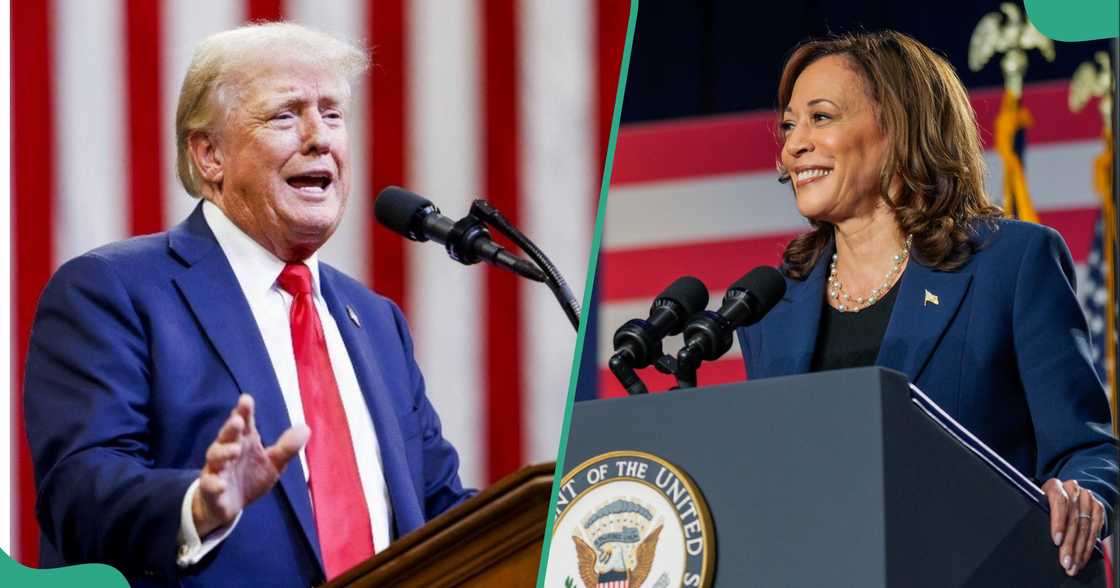Donald Trump Vs Harris: What Happens If 2024 US Presidential Election Ends in Tie? Details Emerge
- As the 2024 U.S. presidential election kicks off, discussions around the potential for an Electoral College tie have emerged
- Analysts suggest that a 269-269 tie could happen if certain states swing in favor of Harris, complicating the race
- In the event of a tie, a "contingent election" would be initiated, where Congress would select the president and vice president
As the 2024 U.S. presidential election begins, the possibility of a tie in the Electoral College has become a topic of speculation.
Lengit.ng reports that with Kamala Harris and Donald Trump competing for a decisive 270 votes out of a total of 538, a tie, while unlikely, is not out of the question.

Source: Facebook
Drawing from history, only one U.S. election, the 1800 race between Thomas Jefferson and Aaron Burr, ended in a tie, which the House of Representatives ultimately decided.
Today, that process remains in place and will be used if neither candidate reaches the 270 threshold.
PAY ATTENTION: Legit.ng Needs Your Help! Take our Survey Now and See Improvements at LEGIT.NG Tomorrow
Could a tie really happen in 2024?
As indicated by CNN politics, analysts point to scenarios that could lead to a 269-269 tie in the Electoral College.
For example, if Kamala Harris secures victories in states like Wisconsin, Michigan, Arizona, Nevada, and picks up one electoral vote in Nebraska but loses Georgia and Pennsylvania, a tie becomes a reality.
The states of Maine and Nebraska, which allocate their electoral votes based on congressional districts rather than a winner-takes-all system, add an extra layer of complexity and can be pivotal in a close election.
Election platforms like 270 to Win allow users to explore potential tie scenarios, emphasizing how narrowly this election could swing one way or another.
What happens if there’s a tie?
If the Electoral College ends in a tie, the next step would be a "contingent election."
Under the 12th Amendment, if no candidate has a majority, Congress takes over the election process.
The House of Representatives would select the president, while the Senate would select the vice president.
According to the 12th Amendment, this contingent election would occur on January 6, right after the newly sworn-in Congress tallies the electoral votes.
Each state’s House delegation would cast one vote for president, requiring 26 votes to secure a win.
In the Senate, each senator votes individually for vice president, with a simple majority needed for a selection.
How does the process work?
In this highly unusual event, representatives face a dilemma: do they support the choice of their party or the choice of their state’s voters?
The House would only choose from among the top three candidates, while the Senate would select from the top two vice-presidential candidates. If a third-party candidate wins electoral votes in a state, they might appear in this selection.
If the House remains deadlocked by Inauguration Day, January 20, the chosen vice president will act as president until a decision is reached.
If neither the House nor Senate has made a final decision by Inauguration Day, the 20th Amendment outlines a temporary solution: the Speaker of the House would serve as acting president.
Currently, that role is held by Mike Johnson, but this could change depending on the House majority after November’s elections.
US election 2024: Nigerians predict winner
Earlier, Legit.ng reported that Nigerians have predicted who will win the US 2024 presidential election as President Joe Biden's tenure nears an end.
In a poll by Legit.ng, Nigerians on social media predicted the candidate who may emerge victorious between Harris and Trump.
Proofread by Kola Muhammed, journalist and copyeditor at Legit.ng
PAY ATTENTION: Сheck out news that is picked exactly for YOU ➡️ find the “Recommended for you” block on the home page and enjoy!
Source: Legit.ng


